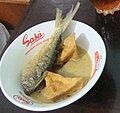Pindang: Difference between revisions
CSV import Tags: mobile edit mobile web edit |
CSV import |
||
| Line 23: | Line 23: | ||
{{Indonesia-cuisine-stub}} | {{Indonesia-cuisine-stub}} | ||
{{food-stub}} | {{food-stub}} | ||
<gallery> | |||
File:Pindang_Patin_Palembang_2.jpg|Pindang | |||
File:Rujak_kuah_pindang.jpg|Pindang | |||
File:Pindang_serani_170526-5307134_krm.JPG|Pindang | |||
File:Pindang_fishes_marketing_at_Kalibaru's_traditional_market,_Banyuwangi,_East_Java,_Indonesia.jpg|Pindang | |||
File:COLLECTIE_TROPENMUSEUM_Vis-bereiding_(pindang)_in_de_visinzoutingsloods_te_Blimbing_Oost_Java_TMnr_10014130.jpg|Pindang | |||
File:Pindang_Patin_Palembang_1.jpg|Pindang | |||
File:Pindang_bandeng_Jepara.JPG|Pindang | |||
File:Telur_pindang.JPG|Pindang | |||
</gallery> | |||
Latest revision as of 11:51, 18 February 2025
Pindang is a cooking method of boiling used in Indonesia to preserve fish and other seafood. Pindang dishes can be found in various regions across the country, each with its own unique variations and ingredients.
Etymology[edit]
The term "Pindang" is believed to have originated from the Javanese language, where it refers to the process of cooking fish or other seafood in a certain way to preserve it. The word is also used in Malay and Indonesian, with similar meanings.
Preparation[edit]
Pindang involves boiling fish or other seafood in a mixture of water, salt, and certain spices. The most commonly used spices are tamarind, turmeric, and chili. The process of Pindang not only preserves the seafood but also imparts a distinct flavor and aroma.
Variations[edit]
There are several regional variations of Pindang in Indonesia. For example, Pindang Serani from Central Java is a sweet and sour fish soup, while Pindang Patin from South Sumatra is a spicy catfish dish. Other variations include Pindang Bandeng from Banten and Pindang Kepala from Lampung.
Cultural Significance[edit]
Pindang is not just a method of preservation but also a part of Indonesian culinary culture. It is often served at special occasions and celebrations, such as weddings and traditional ceremonies. In some regions, Pindang dishes are considered a symbol of hospitality and are often served to guests.
See Also[edit]

This article is a Indonesian cuisine-related stub. You can help WikiMD by expanding it!
-
Pindang
-
Pindang
-
Pindang
-
Pindang
-
Pindang
-
Pindang
-
Pindang
-
Pindang








